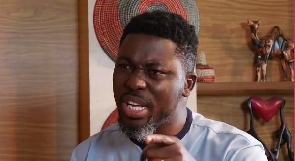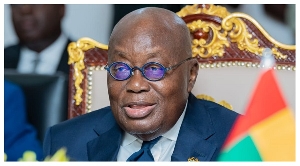- Home - News
- TWI News | TV
- Polls
- Year In Review
- News Archive
- Crime & Punishment
- Politics
- Regional
- Editorial
- Health
- Ghanaians Abroad
- Tabloid
- Africa
- Religion
- Election 2020
- Coronavirus
- News Videos | TV
- Photo Archives
- News Headlines
- Press Release
General News of Sunday, 10 August 2003
Source: The Observer /Richard Wachman
Sam Jonah: Man with the Midas touch
Sam Jonah heads one of the biggest goldmining groups in the world, but he wants to get still bigger
Sam Jonah is the stuff of African legend. Twenty years ago, he became the first Ghanaian managing director of Ashanti Goldfields. Today, after building the company into one of the world's biggest goldmining groups, he is the architect of a $1billion merger with rival AngloGold of South Africa. And, perhaps surprising in an industry that employs tens of thousands of African miners, Jonah is still the only black boss of a goldmining company.
A big man, with a keen intellect and mischievous sense of humour, he is currently 'chilling out' at a health farm about 50 miles north of Cape Town.
'Let me tell you about this place: I had two apples for breakfast, a watermelon for lunch; it will be a slice of pawpaw and a pear for dinner.' He roars with laughter. 'By the end of my stay, I might manage a green salad.' More laughter.
Jonah deserves a rest, especially if an expected rival bid for Ashanti from Randgold, another South African company, sparks a lengthy takeover battle. The last month has been one long round of back-to-back meetings with managers, officials and bankers.
Any deal, which must be approved by the Ghanaian government, would make the new combined company the largest goldmining group on earth, toppling Newmont of the US. That is some achievement for the son of a construction company boss who worked underground at the famous Obuasi goldmine in Ghana's Ashanti region.
'This job comes with its ups and downs, but if I had to do it all again, I wouldn't change anything,' says Jonah. 'The biggest kick has been seeing the gradual empowerment of African man agers and workers. We have a tremendous pool of talent now.'
He started his working life with Britain's Lonrho, the conglomerate led by the late 'Tiny' Rowland, which bought Ashanti for £3 million in 1968. Jonah joined as a trainee, was spotted by Rowland as a promising manager and sent to Camborne School of Mines in Cornwall to brush up on the business.
Jonah and Rowland got on well: the African viewed his UK boss as 'a kind of father figure', and before long Rowland had made him managing director of Ashanti. Jonah was still only 36.
'He taught me a lot about the industry; there is much to be grateful for,' he says. Friends say that behind his jocular and congenial exterior, Jonah has inherited some of the cunning that made Rowland a formidable competitor.
Jonah, now 53, has agreed to postpone his retirement to become president of the merged company, assuming that the deal is waved through. He dismisses rumours, which have circulated over the years, that he is keen to enter politics. 'Those stories are exaggerated. I want to spend more time with my family, not take on another big job.'
Jonah has had his ups and downs with politicians. There were rows with former Ghanaian President Jerry Rawlings, especially three years ago when Ashanti nearly went under after getting badly burnt by investing in derivatives. The relationshipdid not improve when stories circulated in Accra that Jonah was backing one of Rawlings' rivals.
Jonah is a household name in Ghana, and his company is viewed as a national heirloom - that is why analysts are watching closely to see if the Ghanaian Government gives the transaction the green light. There are bound to be conditions attached to ensure that Ghanaian national interests are protected. As Accra can determine who gets licences to mine in Ghana, it holds considerable sway.
But Jonah is optimistic: 'The authorities approved the merger in principle, but SG, the French bank, have been asked by my Government, to provide an independent view of the company's financial value.'
He is tremendously proud that Ashanti is now run by black people. And he believes that the free enterprise system, accompanied by radical reform, is the only way forward for Ghana - and Africa.
'There is a new crop of African lead ers, people like Thabo Mbeki [President of South Africa], who do not want to continue down the path that we have gone down in the last few years; there is a realisation that if the continent is to move forward, we have to tackle issues of corruption, governance and war; we must uphold the rule of law.'
Jonah points out that Africa receives only 2 per cent of the world's direct foreign investment. 'That's not enough, the situation is desperate, without investment, no economy can move forward.'
Another problem is that 33 per cent of Africans' savings are held offshore. If Africa were a more stable place, some of that money would find its way home, and invested locally.
'In Africa, where people can suddenly find themselves in jail, many people are too frightened to keep large amounts of cash in their own country. That's terrible,' says Jonah.
Countries such as Ghana, Kenya and South Africa are establishing 'true democracies' but there is more to be done. Jonah tells the story of a chat that he had with an Indian acquaintance.
'I said to him that I thought India was really cutting it these days, but what was the secret? My friend said that the Indian Government provided a range of incentives for [wealthy] Indians to bring their savings back to the country.'
The upshot has been an extra $70bn in Indian banks and other institutions. According to Jonah, Africa could learn a thing or two from India.
Ashanti, which has expanded rapidly over the last decade, has operations across the continent, from Eritrea to Zimbabwe. The company still accounts for more than half the value of all the firms quoted on the Accra stock market. Ghanaian gold has been famous for at least 500 years and gave colonial Ghana - run by the British - its original name, the Gold Coast. Based in Obuasi, the group was a colonial concern from the turn of the century until independence.
After Rowland acquired the company, the Ghanaian government seized a large stake, but Lonrho managed to keep a minority holding and the rights to manage some of the mines. Lonrho was broken up in the Nineties, but it hived off its African mining interests into a company called Lonmin, which controls 28 per cent of Ashanti. The government holds 17 per cent and a 'golden share', which could be used to block the merger.
But is the deal with AngloGold, which is bigger than Ashanti, really necessary? Jonah rebuts suggestions that the company is being 'swallowed up'.
He says: 'Over the years we have acquired a number of smaller groups, including Britain's Cluff Resources in 1995, but we have always been of the view that the next move would have to be "the big one",' he said. 'That's because Ashanti does not have the resources to open up mines that in some cases are up to one mile below the surface. Nor does it have the skills.'
He adds: 'I am not hung up about independence; Ashanti must grow, and our tie-up with AngloGold is the way to do it.'
As for his future, he is happy to stay in the industry a while longer. 'Providing this business provides a challenge, which it does, and there are still mountains to climb, I wouldn't dream of leaving.'
Profile
Name Sam Jonah
Age 53
Educated Adisadel College, Ghana; Camborne School of Mines, Cornwall; University of Exeter
Career 1971 joined Lonrho, owner of Ashanti Goldfields; 1986 appointed managing director
Family Married with four children
Favourite book Long Walk to Freedom, the autobiography of Nelson Mandela
Interests Keeping parrots, fishing and football
Once said 'If I wasn't black, I'd be white with anger'










